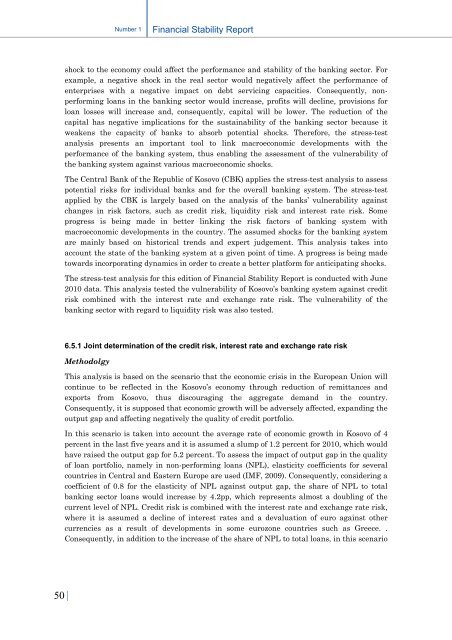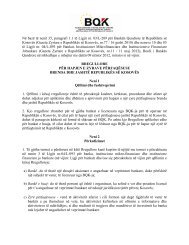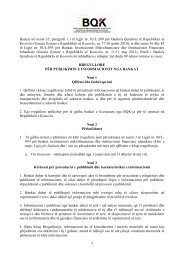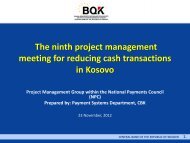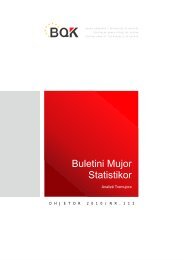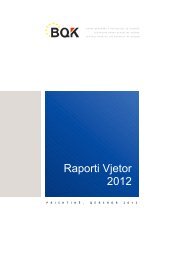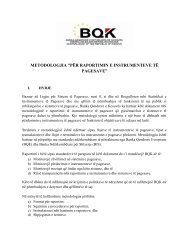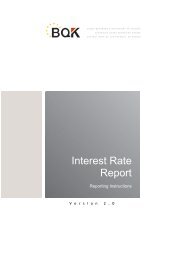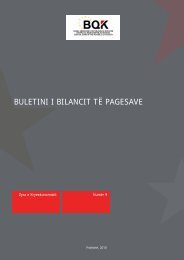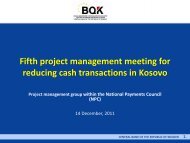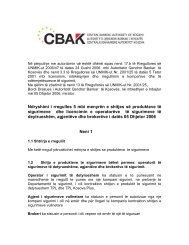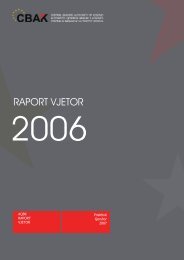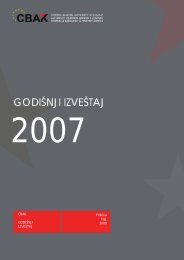Financial Stability Report No1 20 December 2010 - Banka Qendrore ...
Financial Stability Report No1 20 December 2010 - Banka Qendrore ...
Financial Stability Report No1 20 December 2010 - Banka Qendrore ...
You also want an ePaper? Increase the reach of your titles
YUMPU automatically turns print PDFs into web optimized ePapers that Google loves.
Number 1<strong>Financial</strong> <strong>Stability</strong> <strong>Report</strong>shock to the economy could affect the performance and stability of the banking sector. Forexample, a negative shock in the real sector would negatively affect the performance ofenterprises with a negative impact on debt servicing capacities. Consequently, nonperformingloans in the banking sector would increase, profits will decline, provisions forloan losses will increase and, consequently, capital will be lower. The reduction of thecapital has negative implications for the sustainability of the banking sector because itweakens the capacity of banks to absorb potential shocks. Therefore, the stress-testanalysis presents an important tool to link macroeconomic developments with theperformance of the banking system, thus enabling the assessment of the vulnerability ofthe banking system against various macroeconomic shocks.The Central Bank of the Republic of Kosovo (CBK) applies the stress-test analysis to assesspotential risks for individual banks and for the overall banking system. The stress-testapplied by the CBK is largely based on the analysis of the banks’ vulnerability againstchanges in risk factors, such as credit risk, liquidity risk and interest rate risk. Someprogress is being made in better linking the risk factors of banking system withmacroeconomic developments in the country. The assumed shocks for the banking systemare mainly based on historical trends and expert judgement. This analysis takes intoaccount the state of the banking system at a given point of time. A progress is being madetowards incorporating dynamics in order to create a better platform for anticipating shocks.The stress-test analysis for this edition of <strong>Financial</strong> <strong>Stability</strong> <strong>Report</strong> is conducted with June<strong>20</strong>10 data. This analysis tested the vulnerability of Kosovo’s banking system against creditrisk combined with the interest rate and exchange rate risk. The vulnerability of thebanking sector with regard to liquidity risk was also tested.6.5.1 Joint determination of the credit risk, interest rate and exchange rate riskMethodolgyThis analysis is based on the scenario that the economic crisis in the European Union willcontinue to be reflected in the Kosovo’s economy through reduction of remittances andexports from Kosovo, thus discouraging the aggregate demand in the country.Consequently, it is supposed that economic growth will be adversely affected, expanding theoutput gap and affecting negatively the quality of credit portfolio.In this scenario is taken into account the average rate of economic growth in Kosovo of 4percent in the last five years and it is assumed a slump of 1.2 percent for <strong>20</strong>10, which wouldhave raised the output gap for 5.2 percent. To assess the impact of output gap in the qualityof loan portfolio, namely in non-performing loans (NPL), elasticity coefficients for severalcountries in Central and Eastern Europe are used (IMF, <strong>20</strong>09). Consequently, considering acoefficient of 0.8 for the elasticity of NPL against output gap, the share of NPL to totalbanking sector loans would increase by 4.2pp, which represents almost a doubling of thecurrent level of NPL. Credit risk is combined with the interest rate and exchange rate risk,where it is assumed a decline of interest rates and a devaluation of euro against othercurrencies as a result of developments in some eurozone countries such as Greece. .Consequently, in addition to the increase of the share of NPL to total loans, in this scenario50 |


